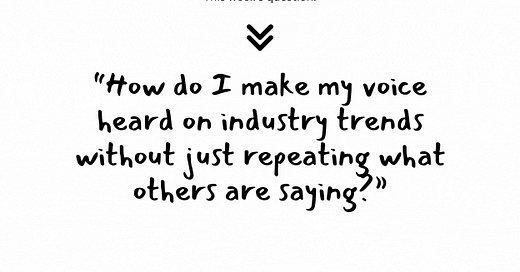Why Many UX Experts Say Nothing New and How You Can Be Different
The PRISM framework for developing your unique UX voice
👋 Happy Saturday, my dear UX friends, Marina here!
Today, let's help this fellow UXer out ↴
"…I've been working as a lead product designer for about 5 years now at a mid-sized tech company. I'm pretty good at what I do, but I feel like I'm hitting a ceiling in terms of recognition and influence. I follow all the UX thought leaders, read the latest articles, and stay on top of industry trends, but when I try to share insights with my team or on LinkedIn, I feel like I'm just echoing what others have already said.
How do I make my voice heard on industry trends without just repeating what others are saying? I want to be seen as a thought leader both within my company and in the broader UX community, but I struggle to find my unique angle. It feels like everything worth saying has already been said by someone with a bigger platform.
I'm worried that without establishing my own perspective, I'll remain stuck at my current level, watching others advance past me. Any advice would be great!"
The eternal challenge of finding your unique voice in a crowded field!
This is something nearly every UXer struggles with at some point in their career.
It's frustrating when you know you have valuable insights to share, but you feel like you're just another voice in the echo chamber.
But here's the truth:
The UX world DOESN’T NEED more people simply amplifying existing ideas.
What it desperately needs is your unique perspective shaped by your specific experiences and observations.
Let's look at how you can cut through the noise and establish yourself as a genuine thought leader with something original to say.
🧠 The Thought Leadership Paradox
Before diving into strategies, let's acknowledge something important:
Most people who call themselves "thought leaders" aren't leading any thoughts.
They're following established patterns and recycling popular ideas.
True thought leadership is NOT about having the most polished slide deck or the catchiest hashtag.
It IS about offering genuine insights that challenge, extend, or reframe existing knowledge.
Here's a framework I call PRISM that will help you develop and share unique perspectives that actually add value to the UX conversation:



